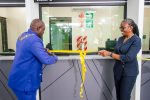In line with the statutory reporting requirements set forth in the Bank of Namibia, 2020 (Act No.1 of 2020), the Governor of the Bank of Namibia (BoN), Johannes !Gawaxab appeared before the Parliamentary Standing Committee on Economics and Public Administration to report on the current operations and affairs of the Bank, the state of the economy, the conduct of monetary policy, amongst other emerging matters over the past year.
The Governor provided an update on the outlook for the domestic and global economies. Domestically, GDP growth is projected to slow to 3.7 percent in 2024 due to factors such as drought and weak global demand for minerals. However, a recovery to 4.1 percent is anticipated in 2025. Globally, the economy is expected to grow at a steady pace in 2024 and 2025, with advanced economies likely to see modest improvements in growth. Emerging markets and developing economies are projected to maintain stable growth rates. Nonetheless, global growth remains below the prepandemic average, posing challenges for Namibia’s export-driven sectors.
During the discussion, the Governor reported on the progress that the central bank has made in ensuring price stability to support sustainable economic growth. Historically, the repo rate and inflation rate have moved in tandem. An analysis of trends from 1992 to 2024 showed that notable fluctuations in these rates often corresponded with periods of economic crises and significant socio, political and geopolitical events. The Governor also highlighted that current inflation and repo rate levels are not comparable to those of the 1990s and 2000s, adding that the current repo rate of 7.75 percent is significantly lower than the rates exceeding 20.00 percent in 1998 and 9.00 percent in 2008.
He remarked: “The lower repo rates observed before and during the COVID-19 period have lent to the perception that the recent increases in the repo rate are unprecedented. However, the recent decreases in inflation are encouraging, and if this trend continues, it could create a more favourable environment for relief in the future.”
The Governor also highlighted the success of the SME Economic Recovery Loan Scheme, which has been instrumental in supporting small and medium enterprises across various sectors. With a total facility of N$500 million, the Scheme has already disbursed N$378.9 million to assist distressed businesses. The funds have been allocated to key sectors including agriculture, manufacturing, retail and services, providing much-needed financial relief and enabling these enterprises to sustain operations, protect jobs and contribute to the overall economic recovery of Namibia.
The Governor highlighted that the Bank is in the final year of executing its strategic plan (2022-2024) and has made significant progress in its four strategic focus areas: Purpose, Stakeholder Engagement, Talent and Transformation, and Future-Fit Organisational Efficiency and Effectiveness. The Bank has achieved regulatory improvements, legal framework enhancements and strong stakeholder engagement. Notably, the Bank declared a dividend of N$511.5 million to the State Revenue Fund for the 2023 financial year, driven by higher interest rates and average investment balances.
The discussions covered several other important topics, including the implementation of new financial regulations such as the Payment System Management Act, 2023 (Act No. 14 of 2023), the Virtual Assets Act, 2023 (Act No. 10 of 2023), and the Banking Institutions Act, 2023 (Act No. 13 of 2023), as well as the recent launch of the Instant Payment Project. The Parliamentary Standing Committee also enquired about the interventions made by the Bank to provide strategic advice to the Government on oil and gas ventures as well as the impact of public debt on the country’s financial status.
The Governor concluded the engagement by re-affirming the Bank’s commitment to its mandate and strategic goals. He emphasised the importance of collaboration with the Parliamentary Standing Committee to ensure the continued stability and development of Namibia’s financial sector.
The Parliamentary Standing Committee on Economics and Public Administration is responsible for monitoring, enquiring into and making recommendations to the National Assembly on matters that may directly or indirectly affect the economy, natural resources and public administration of the Republic of Namibia and its people, amongst other matters.










